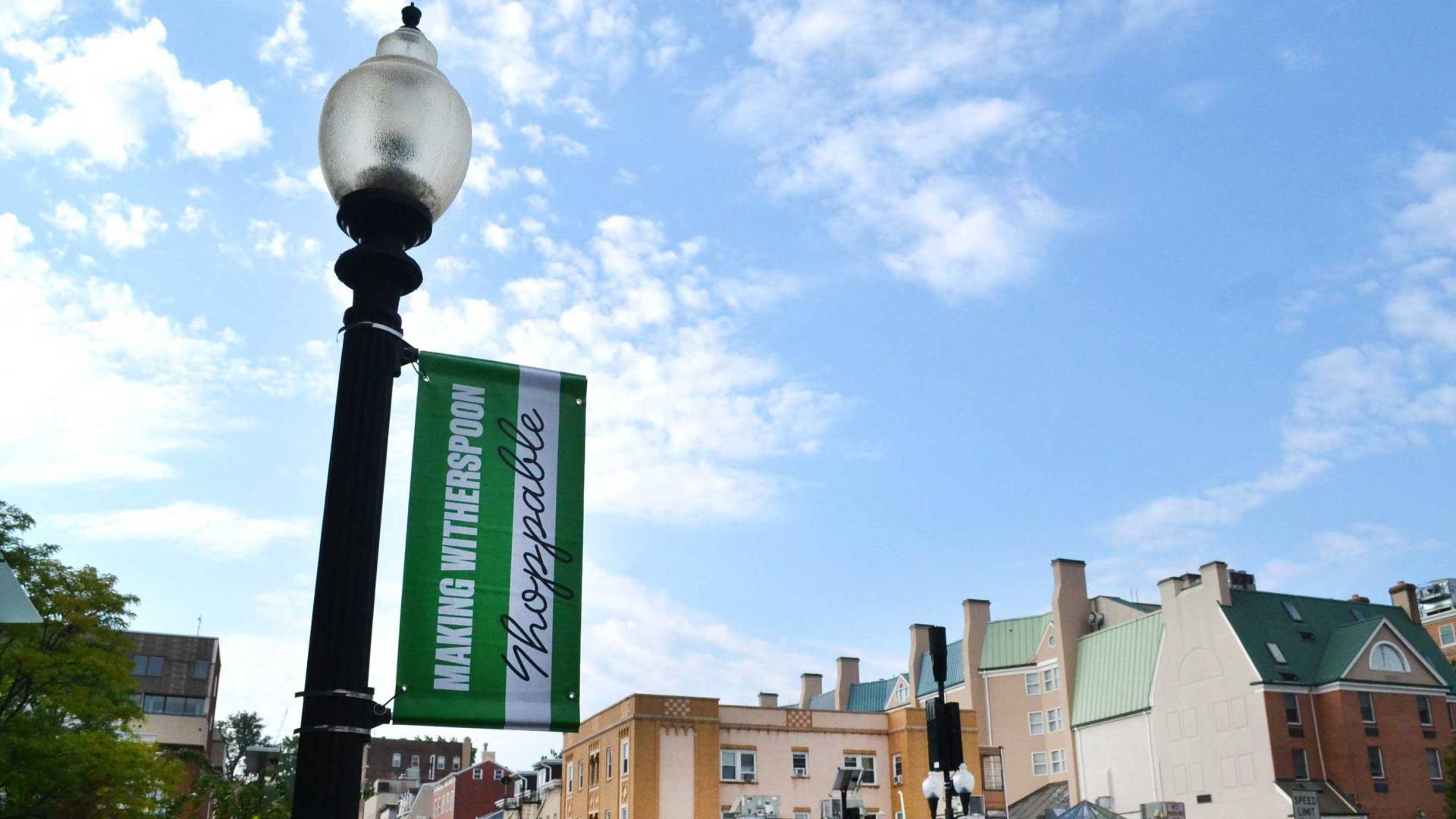In 2022, the University coordinated with the town to create and install the “Making Witherspoon” signage campaign to provide residents and visitors with information about the Witherspoon Street Reconstruction Project.
Summary of the many ways in which Princeton University currently contributes to and engages with the Princeton community. Submitted in a memo to the Princeton mayor and council on Feb. 22, 2023.
Contributions to Princeton: Overview
Voluntary contributions to Municipality of Princeton
For decades, Princeton University has made voluntary contributions to the Municipality of Princeton. In late 2020, the municipality and the University agreed to a two-year extension of the existing contributions agreement that had been adopted in 2014. Under the 2020 agreement, the University contributed a total of $8.2 million to the municipality in 2021 and 2022, which included $850,000 to support the hiring of career personnel for the Princeton Fire Department. The agreement also included a $250,000 commitment toward the construction of a new storage facility for the municipal Department of Public Works.
Voluntary tax payments for properties that could be exempt
The University is the largest property taxpayer in the municipality, paying $11.6 million in property and sewer taxes in 2022. The $11.6 million includes about $6.2 million in tax payments for properties that are eligible for exemption from property taxes.
COVID-19 community support
Starting in the earliest days of the pandemic, the University worked with community partners to support local relief efforts. These efforts include the establishment of the $1 million Princeton University Relief Fund to provide direct financial support to community organizations and businesses. Additional initiatives include initiatives by Campus Dining that provided meals to food insecure individuals and families in the Princeton area, donation of Personal Protective Equipment (PPE) to local first responders, hosting community blood drives, and creation of an online tutoring program to assist area school children. Through the “Tigers in Town” initiative, students supported local businesses with group purchasing at scheduled in-store events. The University also made a contribution of $225,000 to Princeton Public Schools for tents used to provide outdoor teaching and gathering space.
Police, fire and emergency services
The University provides significant support for police, fire and emergency services in the community. The University Department of Public Safety (DPS) has a staff of 111 including sworn officers, non-sworn security officers, fire marshals, supervisory, dispatch and administrative staff. DPS operates 24 hours per day/365 days per year, and works in close collaboration with the municipal police department.
The University has supported the Princeton Fire Department with annual financial contributions and major capital gifts as well as by allowing its employees to serve as volunteers with the department during their paid work hours. Currently 25 University employees are associate members of the Princeton Fire Department, providing critical daytime support to the paid and volunteer members of the department.
Over many years the University has supported the Princeton First Aid and Rescue Squad (PFARS) through annual contributions, major capital gifts and in-kind services such as housing and telecommunications support.
The University collaborates regularly with the municipality and Mercer County to support emergency communications systems, including allowing cell equipment to be installed on its buildings, reducing the need for monopoles in town.
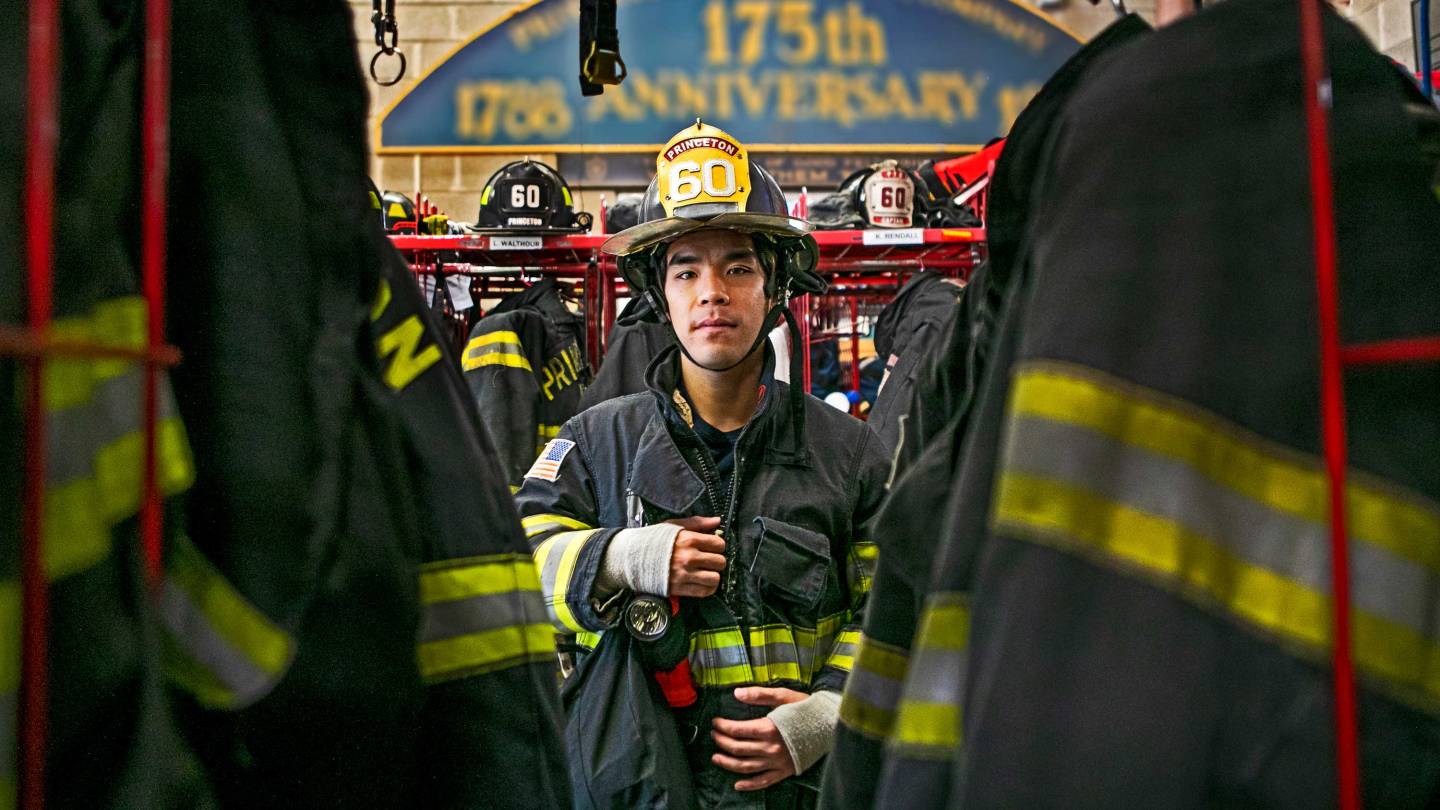
Max Nguyen, a Princeton University graduate student in integrative genomics, suits up for duty as a firefighter for Princeton Engine Company No. 1.
Contributions to important community organizations/initiatives
Apart from its contributions to the municipality, Princeton University remains committed to supporting initiatives that enrich the quality of life in Princeton. The University has a long history of support for affordable housing. Over the years, the University has made cash and in- kind contributions to an array of local projects and nonprofit organizations. Also, the University has made substantial in-kind and financial contributions to the Princeton Public Schools.
Private roads and transit system maintained by the University and used by the public
The University owns approximately five miles of private roads in the Municipality of Princeton, such as Faculty Road and College Road, which are open to the public. In addition to paying taxes on these roads, the University maintains them at its own cost, including providing snow removal. The University also operates the TigerTransit bus system, which is free and open to the public.
Education and outreach
As an educational institution, Princeton University offers numerous programs that welcome community members or are aimed primarily at area residents. Students at local high schools, including Princeton High School, can take coursework at the University; many different University initiatives provide tutoring to public school students; and the University runs a preparatory program for economically disadvantaged students in the area. Almost half of the participants in the Community Auditing Program are Princeton residents, participating in University classes for a modest fee, and thousands more attend hundreds of free public lectures offered each year at the University.
The Princeton University Art Museum, Richardson Auditorium and McCarter Theatre, and the Lewis Center for the Arts provide a wide variety of arts programming. In addition, the University Chapel, the Music Department and various concert series offer musical performances year-round. The University owns the Garden Theatre, which is operated by the non-profit Renew Theaters.
Volunteer activity and civic engagement
Princeton’s mission of teaching and research has an emphasis on service, and students volunteer with more than a dozen local community organizations. Some of this activity begins before they even take their first class at Princeton, through Community Action. The University has a long history of working with numerous organizations that seek to meet the needs of local residents and create a fully inclusive and supportive community.
The following provides detailed information on these and other contributions by the University to the community.
Contributions to Princeton
Voluntary payments (calendar year basis)
- In 2022, Princeton University made a voluntary payment of $3.9 million to the Municipality of Princeton.
- This includes a $150,000 contribution to support the hiring of career personnel for the Princeton Fire Department.
- From 2014 to 2020, the University contributed more than $18.7 million to the municipality per a seven-year contribution agreement.
- In December 2020, the municipality and the University agreed to a two-year extension of the 2014 contribution agreement. The University contributed a total of $8.2 million to the municipality in 2021 and 2022.
- The agreement also included an additional commitment to contribute $250,000 toward the anticipated construction of a new storage facility for the municipal Department of Public Works equipment.
Taxes paid (calendar year basis)
- In 2022, Princeton University paid $11.6 million in property and sewer taxes to Princeton; Princeton University is the largest taxpayer in Princeton.
- Of the $11.6 million property and sewer taxes paid, $4.8 million went to the Princeton Public Schools.
- Of the $11.6 million property tax payment, about $6.2 million was paid on property that is eligible for exemption under state law.
The town’s AAA bond rating is partially based on the “stabilizing presence of Princeton University”
- In rating the municipality, Moody’s cites “the stabilizing presence of Princeton University” and notes that “Princeton University contributes to the municipality’s strong local economy.” Its AAA rating reduces the town’s borrowing costs below the costs of many other municipalities.
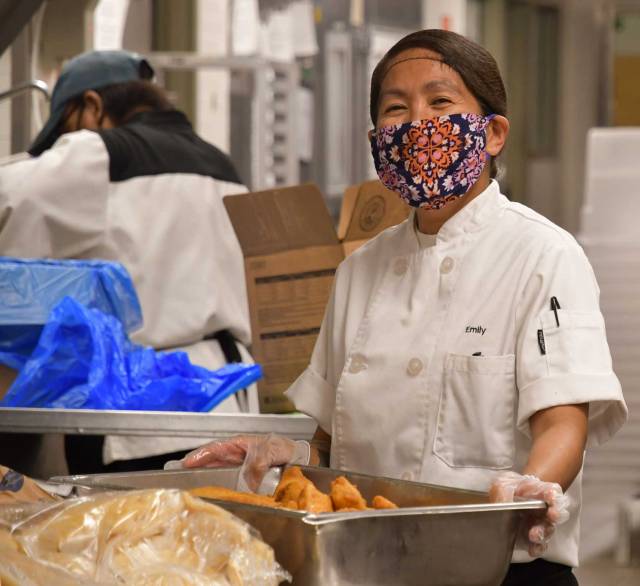
In collaboration with the Princeton Public Schools and three area nonprofits, Princeton University’s Summer Food and Nutrition Program provided meals for local at-risk families, children and individuals throughout Mercer County. Pictured: Emily Capunpon, a cook with Campus Dining, prepares meals in the Butler/Wilson College kitchen.
Support to the community during COVID-19
- The $1 million Princeton University Relief Fund provided direct support to the following organizations:
- $400,000 to the Princeton Area Community Foundation COVID Relief Fund
- $100,000 to the Coronavirus Emergency Relief Fund coordinated by the Princeton Children’s Fund
- $350,000 to launch the Princeton Small Business Resiliency Fund
- $50,000 to the Arts Council of Princeton to support “re-imagining” of the annual Communiversity event as April ARTS
- $225,000 to the Princeton Public Schools for tents used to provide outdoor teaching and gathering space.
- In 2022 provided space in Jadwin Gym for 16 vaccination clinics that were open to the public. University staff managed these vaccination clinics in coordination with the Princeton Board of Health. From 2021 to 2022, there were a total of 66 vaccination clinics open to the public in Jadwin Gym where more than 19,000 doses of the Pfizer, Moderna and Janssen vaccines, including booster shots, were administered.
- Campus Dining efforts to combat food insecurity included:
- Preparation of 21,000 meals distributed in Summer 2020 in collaboration with the Princeton Public Schools for students eligible for the free/reduced price lunch program
- Preparation of more than 2,500 meals provided to Meals on Wheels in Summer 2020 for delivery to home-bound individuals in Princeton, East Windsor, West Windsor and Hightstown
- Preparation of over 15,200 meals distributed in Summer 2021 to the Rescue Mission of Trenton, Homefront and the Trenton Area Soup Kitchen.
- Contributed $25,000 to Send Hunger Packing Princeton to provide weekend meals during Spring 2020 for delivery to students eligible for the free/reduced price lunch program
- Hosted on-campus community blood drives that were open to the public
- Donated thousands of Personal Protective Equipment (PPE) items to local first responders
- Provided Zoom webinar technology, and training for municipal staff, for use in Princeton Mayor-Council and board/commissions during the pandemic crisis.
- Student-led relief efforts have included:
- The “Tigers in Town” initiative supports local businesses with group purchasing at scheduled in-store events. In 2022, this initiative led to approximately $24,000 in purchases at 24 participating businesses
- The “Tigers for Nassau” initiative provides assistance to local businesses seeking to improve their online sales and marketing capacity
- The “Taste of Campus” initiative led by the Class of 2021 resulted in over 400 gift boxes with items from local businesses being delivered across the country
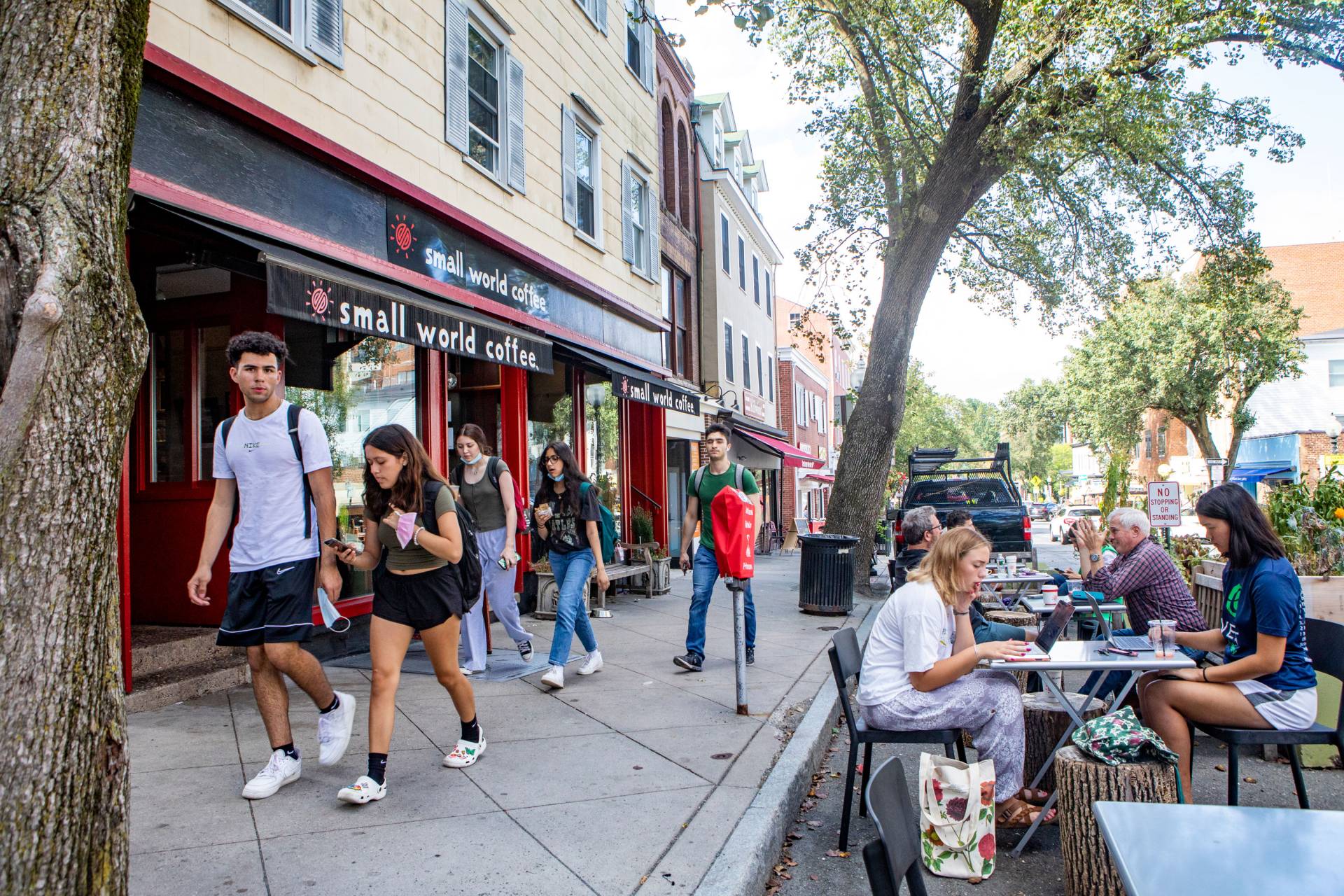
Princeton University launched Tigers in Town during the COVID-19 pandemic to support struggling local businesses while providing a safe way for students to socialize. The University continues to support local dining by students through the Pay with Points program.
Contributions to community organizations/initiatives in 2022 included:
- Princeton Senior Resource Center
- Princeton First Aid and Rescue Squad
- Princeton Fire Department
- Watershed Institute
- Princeton Human Services Commission Annual Backpack Drive
- Princeton Arts Council Martin Luther King Jr. Day programs
- Princeton Arts Council Porchfest
Community resources
- Garden Theatre
- The theater is owned by the University and operated by a separate non-profit organization, Renew Theaters
- Labyrinth Books
- The University helped to bring in, and maintain, an independent bookstore in Princeton
- Nassau East
- The University owns and manages properties around 185 Nassau St. which house a variety of local businesses
- Princeton Station
- The University maintains the Princeton Station complex that is served by the NJTransit Princeton to Princeton Junction “Dinky” rail line
- The Garden Theatre, Labyrinth Books, Princeton Station and the commercial and residential properties at Nassau East are all tax-paying properties
Police
- The Princeton University Department of Public Safety (DPS) and Princeton Police Department (PPD) command staff meet to review issues and plan for upcoming town and/or University events.
- Throughout the year PPD and DPS assist each other in criminal investigations, and noncriminal cases.
- Additionally, PPD and DPS assist each other by providing services when additional assistance is requested, such as assistance in locating missing individuals, traffic control, traffic accidents, serving subpoenas, use of Spanish-speaking DPS officers for interview purposes, transportation from PPD to campus for students.
- In 2022, DPS received and responded to five such service requests from PPD.
- During 2022, DPS requested the services of PPD for seven calls where their services were needed.
- DPS filed 45 police cooperation reports with PPD.
- This type of report is filed when there is an interaction of any kind between PPD and DPS that is not investigated by DPS or does not result from a call into DPS jurisdiction.
- PPD is invited to participate, at no charge, in in-service training held on campus and sponsored by DPS.
- Upon request, DPS provides mutual aid to PPD for staffing large community events.
- PPD extends an invitation to utilize their firing range to DPS. DPS has contributed funds towards capital improvements at the firing range and also provided funding for training equipment.
Emergency Services
- University staff participate in Princeton’s Local Emergency Preparedness Committee (LEPC).
Emergency Communication Systems
- Mercer County’s countywide public safety communications systems continue to be supported at Fine Hall.
- Equipment and antenna support for PPD, PFARS and PFD is located at Fine Hall.
- University technical resources support PPD on an as-requested basis with radio communications-related questions or issues around operations or new equipment.
- DPS also assisted with reprogramming the pagers for the University Associate Program at the request of PFD.
Princeton Fire Department (PFD)
- PFD Associate Member Program: University staff serve as PFD volunteers during the weekday from 8 a.m. to 4 p.m. for which they are compensated by the University.
- In October 2022, the Associate Member Program re-instituted duty days after a COVID-19 induced pause in response.
- The program currently has 25 members in active status.
- Members responded to 92 calls in 2022. This ranged from single members to full crews depending on availability of personnel.
- Members logged a total of 210 hours in program activities that included response, training and meetings.
- DPS leadership has regular meetings with PFD leadership and the director of Emergency and Safety Services to discuss collaboration, operations, response and emergency management.
- Engine 66 from the Princeton University’s Princeton Plasma Physics Laboratory (PPPL) responds regularly to Princeton for fire calls as mutual aid to the PFD.
- PFD came to campus twice in 2022 for training.
- PFD responded to campus incidents 32 times in 2022.
Princeton First Aid and Rescue Squad (PFARS)
- DPS leadership has regular meetings with PFARS leadership to discuss collaboration, operations, response and emergency management.
- University students are active volunteer members of PFARS.
- The University makes available parking on campus, with accessible power, for a PFARS ambulance to facilitate response by student volunteers.
- The University hires PFARS for stand-by requests at University events. PFARS was compensated for 34 EMS standbys during the calendar year of 2022.
Cell towers
- There are eight wireless cell towers on University buildings.
Maintenance of approximately five miles of roads in Princeton used by the public
- Annual cost to the University is approximately $500,000.
Collaboration on local and regional planning issues
- The University Office of Community and Regional Affairs maintains and updates semi-annually the Princeton Community Map posted at kiosks and bus stops in town and on campus.
- In 2022, the University coordinated with the town to create and install the “Making Witherspoon” signage campaign to provide residents and visitors with information about the Witherspoon Street Reconstruction Project.
- The University donated planters and trees to the town to be temporarily located along Witherspoon Street as the construction was underway.
Transportation
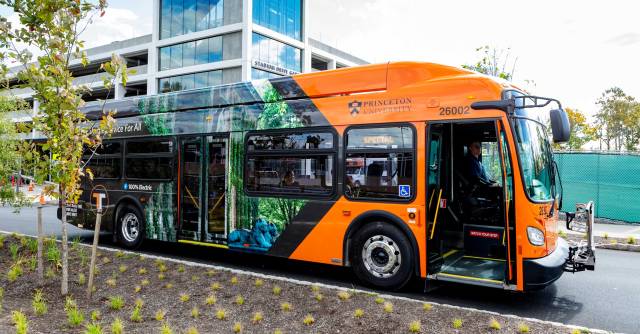
In November 2022, the University debuted its first battery electric bus (pictured) on TigerTransit routes. TigerTransit is free and open to the public and annually provides more than 500,000 passenger rides.
- TigerTransit is “free and open to the public” and annually provides more than 500,000 passenger rides in a normal year. TigerTransit has resumed full service levels, and as of fall 2022, ridership has returned to 93% of pre-pandemic levels.
- In November 2022, the University debuted its first battery electric bus on TigerTransit routes. The new bus is the first of a 17-vehicle fleet. Each bus is 35-feet in length, seats 26 passengers and accommodates 18 standees, includes two wheelchair positions with one automated wheelchair securing device, 14 USB chargers, automated voice announcements for stops, and an air cleaning device to reduce exposure to airborne viruses. The buses will operate from a new charging facility in West Windsor, with an additional on-campus charging facility to Faculty Road. Princeton University be the first Ivy League school to complete a full transition to zero-emission transit vehicles, and among the first operations to do so in the United States.
- TigerAccess, a point-to-point reservable service for persons with temporary or permanent disabilities, currently provides between 20 to 40 trips on weekdays, with service also available on weekends, and is available to the University community and visitors.
- In August 2022, the University opened a new, state-of-the-art, 1,500 space parking facility, Stadium Drive Garage. The garage is the University’s new primary parking facility for daily visitors with frequent TigerTransit service. The garage features new wayfinding tools including real-time bus arrival information, a climate-controlled transit shelter, covered bike parking, 65 electric vehicle charging stations, and real-time occupancy information and wayfinding to locate open spaces.
- While the new garage is available to visitors at any time with a daily permit, the majority of Princeton’s parking facilities are open to the public after 4 p.m. on weekdays, any time during the weekends, and on University holidays.
- Transportation and Parking services has installed real-time parking occupancy signs at the Theater Drive Garage and Prospect Avenue Garage, which are popular evening and weekend parking facilities for the public and to support campus events.
Resource Recovery Program (formerly known as Surplus Equipment Program)
- Access provided for area nonprofit organizations to the University Resource Recovery Program. Items are provided free of charge to area nonprofits for their organizational use.
Education outreach
- Princeton High School (PHS) students who have exhausted coursework at the high school can take classes at the University; coordinated by PHS guidance department.
- Tutoring is available for Princeton Public Schools students through Community House programs.
- Princeton University Preparatory Program (PUPP), a college prep program for economically disadvantaged students, is open to Princeton High School students.
- Princeton Center for Complex Materials (PCCM) holds special events open to the community, including a Holiday Science Lecture.
- Princeton Plasma Physics Laboratory (PPPL) hosts Science on Saturday lectures in the winter months.
- Cotsen Children’s Library Program for Teacher Preparation “Time Travel 101,” young writers mentorship program One to One, escape room and other resources are available virtually for children up to age 12.
- Many lectures and other intellectual and cultural offerings on campus are open to the public and almost always free of charge.
Community Auditing Program
- Approximately 54% of the program participants each semester are from Princeton.
- The program includes special courses and lectures designed especially for auditors.
Entrepreneurship and design thinking
- The University’s Entrepreneurial Hub (eHub) is located at 34 Chambers St. The space provides a location for the exchange of ideas — a place where creative and talented entrepreneurs from the University and the community can come together to learn from one another, establish connections, and make contributions to the local and regional entrepreneurial ecosystem.
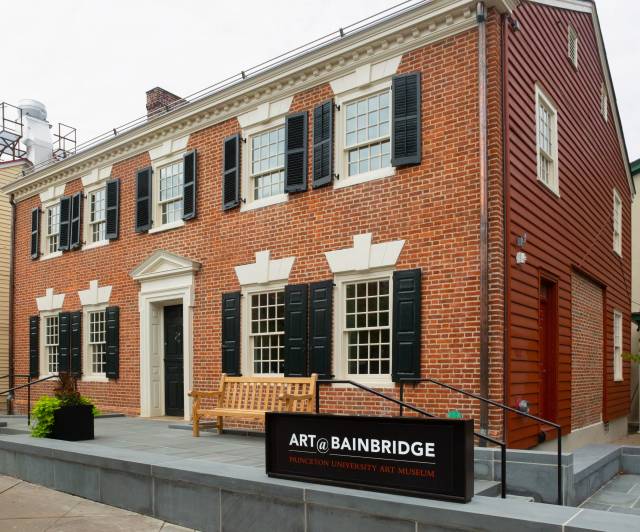
Art@Bainbridge, located at 158 Nassau St. in the historic Bainbridge House adjacent to the Princeton Garden Theatre, presents monographic shows five times a year.
Cultural offerings
- Princeton University Art Museum
- Art@Bainbridge gallery
- Art on Hulfish gallery
- Art Museum Store on Palmer Square
- Provides a wide variety of free educational and family programming
- Theaters
- McCarter Theatre Center owned and financially supported by the University and operated by a separate, independent non-profit
- Theater Intime provides academic year programming open to area residents in Hamilton Murray Theater
- Additional theater, dance and visual arts programming available at other locations on campus, including 185 Nassau St.
- Musical Performance
- Performances at Richardson Auditorium and Taplin Auditorium
- Summer Carillon Concerts at the Graduate College
- Chapel
- Weekly “After Noon” organ concerts
- Monthly Jazz Vespers services
- Special performances sponsored by the Chapel Music program
- Veterans Day Observance Program in Princeton Chapel held in coordination with Spirit of Princeton
- Princeton University Concerts
- Hosts annual music series featuring classical music performed by international professional musicians in Richardson Auditorium and across campus
- “Healing with Music” conversation/concert series addressing the intersection of music with topics such as long COVID-19, brain injury, HIV/AIDS, and mental health
- Live Music Meditation series
- “Meet the Music” family concerts, including programs for neurodivergent audiences
- “Do-Re-Meet: Social Events for Music Lovers”
- Annual Chamber Jam inviting amateur musicians in the community to play music together
- Music-related film screenings at the Princeton Garden Theatre
- Free online library of music videos and conversations with musicians, and a “Collective Listening Project” of over 60 playlists curated for the public by prominent musical figures
Community events on campus in 2022
- Five community blood drives
Worship
- Community members participate in Chapel services on a regular basis and on special occasions.
- Community members also participate in services by religious groups associated with the University through chaplaincy programs and the Center for Jewish Life.
Athletics
- Tickets to athletic events on campus are free or low-cost.
- Carnegie Lake is open to the public for recreational ice skating in collaboration with Princeton Recreation Department.
- Princeton student-athletes undertake numerous volunteer efforts through the Princeton Varsity Club and as teams.
Campus Dining
- Staff from Campus Dining produced and served 80 meals to the Princeton local community at Cornerstone Kitchen.
- Produce donated to TASK and Habitat for Humanity after reunions and commencement.
Service and Civic Engagement
- Students, faculty and staff volunteer their time and talents throughout the academic year, summer and during the University’s annual Month of Service in January, with many non-profit organizations focused on the Princeton community including:
- Arm in Arm, Center for Supportive Schools, Corner House, Cornerstone Community Kitchen, Dillon Youth Basketball League, HomeFront, Princeton Fire Department, Princeton First Aid and Rescue Squad, Princeton Healthcare System, Princeton Period Project, Princeton Regional Schools (elementary, middle school, high school), Princeton Nursery School, Princeton Senior Resource Center, Princeton YMCA, YWCA Princeton
- Faculty and staff donated 187 backpacks filled with school supplies as part of the annual Princeton Human Services annual Backpack Drive.
- Through the Program for Community-Engaged Scholarship (ProCES) faculty and students connect community engagement with academic learning by partnering with nonprofit, public sector, and nongovernmental organizations as part of approximately 60 Princeton University courses during the academic year.
- In the past year ProCES courses included locally-based work with the Arts Council of Princeton, the Bayard Rustin Center for Social Justice, Burke Foundation Early Childhood Center at Princeton YWCA, Corner House, Einstein’s Alley, English as a Second Language at Princeton YWCA, Friends of Princeton Open Space, Princeton Recreation Department, Princeton Senior Resource Center, Princeton Theological Seminary, Watershed Institute, and observations of meetings of the Princeton Council.
- The Community Service Interclub Council (CSICC), a collaborative initiative of the eating clubs, coordinates volunteer activities undertaken by the clubs with numerous local organizations.
- The Pace Center for Civic Engagement undertakes a wide variety of programming in the local community, including:
- Nearly 700 first year students partnered with over 85 campus and community partners in the Community Action program.
- Students in this program staying in Princeton were given tours of the community conducted by Fern Spruill, community partner-in-residence, providing an introduction to Princeton history. Students were also invited to participate in the online Albert E. Hinds Memorial Tour: African American Life in Princeton.
- Students focused on essential needs partnered with the Princeton Health Department canvassing neighborhoods.
- Students focused on education and youth programming partnered with the Princeton Mobile Food Pantry, Princeton Nursery School, Princeton Art Community House Museum, Princeton Fire Department, Princeton University Preparatory Program and Community House After School program.
- Provided back-to-school supplies for area youth, distributing over 100 back-to-school supply kits.
- Provided academic and social-emotional literacy support services to the youth and families of Princeton.
- Community House Summer Camp resumed in-person programing in summer 2022. Focusing on the performing arts, the camp culminated in a full-scale production of "Into The Woods Jr."
- 2022 Youth Leadership Summit took place on Friday, Nov. 11 and brought 35 youth participants to the Princeton University campus. The summit provides high school-aged students with the opportunity to enhance their leadership, academic and social-emotional literacy skills.
- Community House After School Program resumed full-scale operations in fall 2022, offering support to 30 middle and high school-aged students.
- Community House Big Sibs, Community House SAT Prep, and Community House Princeton Youth Enrichment resumed in-person programming.
- Academic Success Today, a collaboration between Community House and Corner House, resumed full scale in-person programming.
- In-person volunteering at Princeton Nursery School resumed in fall 2022. Young learners’ activity kits continue to be developed and distributed to Princeton Nursery School.
- Student Volunteers Council (SVC) CONTACT Princeton provides student volunteers who answer phone calls for a local crisis hotline and the national suicide hotline throughout Mercer County, including the Princeton community.
- SVC Penn Medicine Princeton Medical Center program is once again active and sending University student to volunteer with units such as the emergency room, pediatrics or neurology.
- SVC Princeton First Aid and Rescue Squad (PFARS) was the only project that continued to send in-person volunteers throughout the pandemic. PFARS has potential volunteers taking the EMT courses and once certified they serve community as Emergency Medical Technicians working with other squad volunteers and paid staff to respond to 911 emergency medical calls in the community.
- SVC Kidney Disease Screening and Awareness Program (KDSAP) is a Princeton chapter of a national organization that sets up free community health education and screenings in the Princeton community. They have once again organized with their medical advisor, municipal health outreach workers, local community health advocates, and religious organizations to set up events in Princeton.
- The Special Olympics Rowing chapter at Princeton provides instruction and training at the University Boat House for local Special Olympic families in Princeton.
- Princeton University students participated in summer internships in the Princeton community through the RISE (Recognizing Inequities and Standing for Equality) and PICS (Princeton Internships in Civic Service) programs. Students learned from and completed projects with Climate Central, Institute for Citizens and Scholars, Princeton AlumniCorps, Princeton in Africa, Princeton Civil Rights Commission, Princeton Mutual Aid, Princeton Summer Journalism Program, and internships associated with Princeton University departments.
- Nearly 700 first year students partnered with over 85 campus and community partners in the Community Action program.
